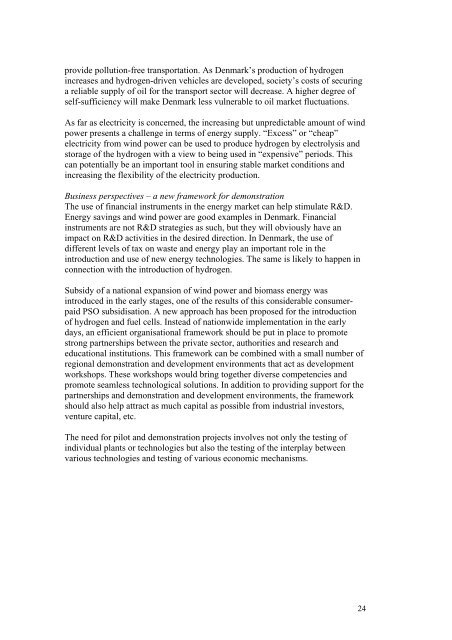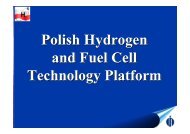Danish Strategy for Hydrogen and Fuel Cells - HY-CO Home
Danish Strategy for Hydrogen and Fuel Cells - HY-CO Home
Danish Strategy for Hydrogen and Fuel Cells - HY-CO Home
Create successful ePaper yourself
Turn your PDF publications into a flip-book with our unique Google optimized e-Paper software.
provide pollution-free transportation. As Denmark’s production of hydrogen<br />
increases <strong>and</strong> hydrogen-driven vehicles are developed, society’s costs of securing<br />
a reliable supply of oil <strong>for</strong> the transport sector will decrease. A higher degree of<br />
self-sufficiency will make Denmark less vulnerable to oil market fluctuations.<br />
As far as electricity is concerned, the increasing but unpredictable amount of wind<br />
power presents a challenge in terms of energy supply. “Excess” or “cheap”<br />
electricity from wind power can be used to produce hydrogen by electrolysis <strong>and</strong><br />
storage of the hydrogen with a view to being used in “expensive” periods. This<br />
can potentially be an important tool in ensuring stable market conditions <strong>and</strong><br />
increasing the flexibility of the electricity production.<br />
Business perspectives – a new framework <strong>for</strong> demonstration<br />
The use of financial instruments in the energy market can help stimulate R&D.<br />
Energy savings <strong>and</strong> wind power are good examples in Denmark. Financial<br />
instruments are not R&D strategies as such, but they will obviously have an<br />
impact on R&D activities in the desired direction. In Denmark, the use of<br />
different levels of tax on waste <strong>and</strong> energy play an important role in the<br />
introduction <strong>and</strong> use of new energy technologies. The same is likely to happen in<br />
connection with the introduction of hydrogen.<br />
Subsidy of a national expansion of wind power <strong>and</strong> biomass energy was<br />
introduced in the early stages, one of the results of this considerable consumerpaid<br />
PSO subsidisation. A new approach has been proposed <strong>for</strong> the introduction<br />
of hydrogen <strong>and</strong> fuel cells. Instead of nationwide implementation in the early<br />
days, an efficient organisational framework should be put in place to promote<br />
strong partnerships between the private sector, authorities <strong>and</strong> research <strong>and</strong><br />
educational institutions. This framework can be combined with a small number of<br />
regional demonstration <strong>and</strong> development environments that act as development<br />
workshops. These workshops would bring together diverse competencies <strong>and</strong><br />
promote seamless technological solutions. In addition to providing support <strong>for</strong> the<br />
partnerships <strong>and</strong> demonstration <strong>and</strong> development environments, the framework<br />
should also help attract as much capital as possible from industrial investors,<br />
venture capital, etc.<br />
The need <strong>for</strong> pilot <strong>and</strong> demonstration projects involves not only the testing of<br />
individual plants or technologies but also the testing of the interplay between<br />
various technologies <strong>and</strong> testing of various economic mechanisms.<br />
24




